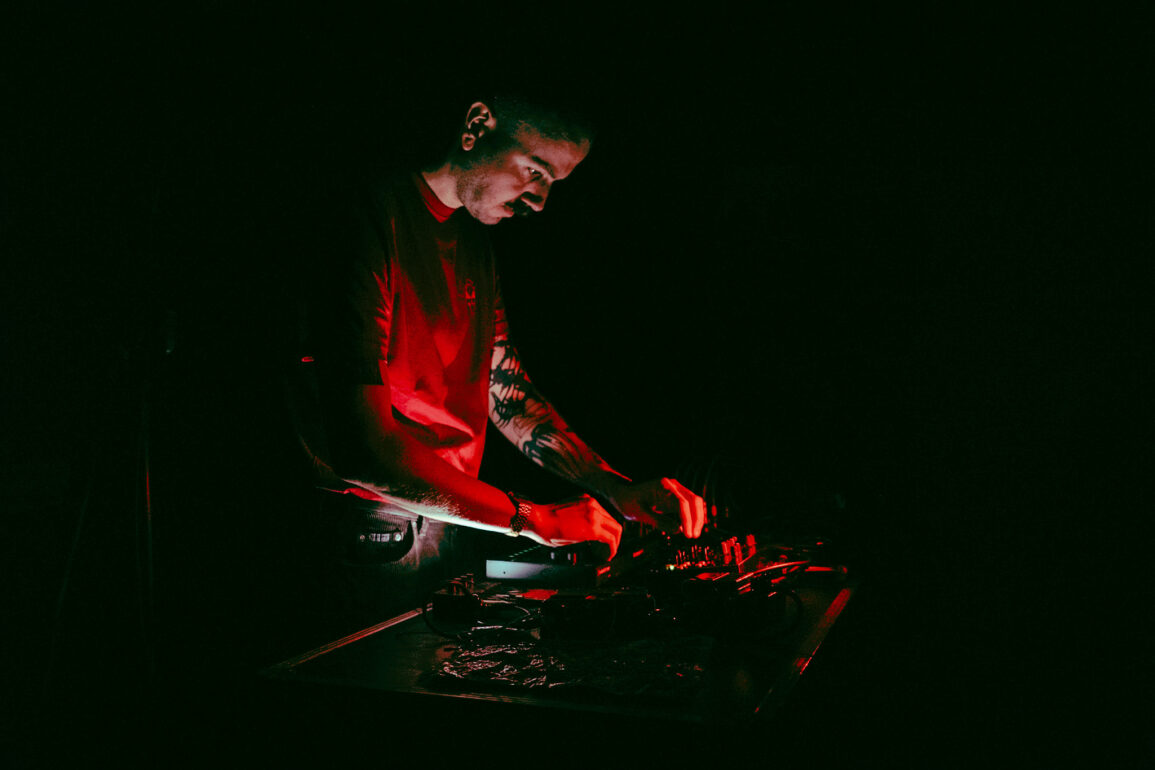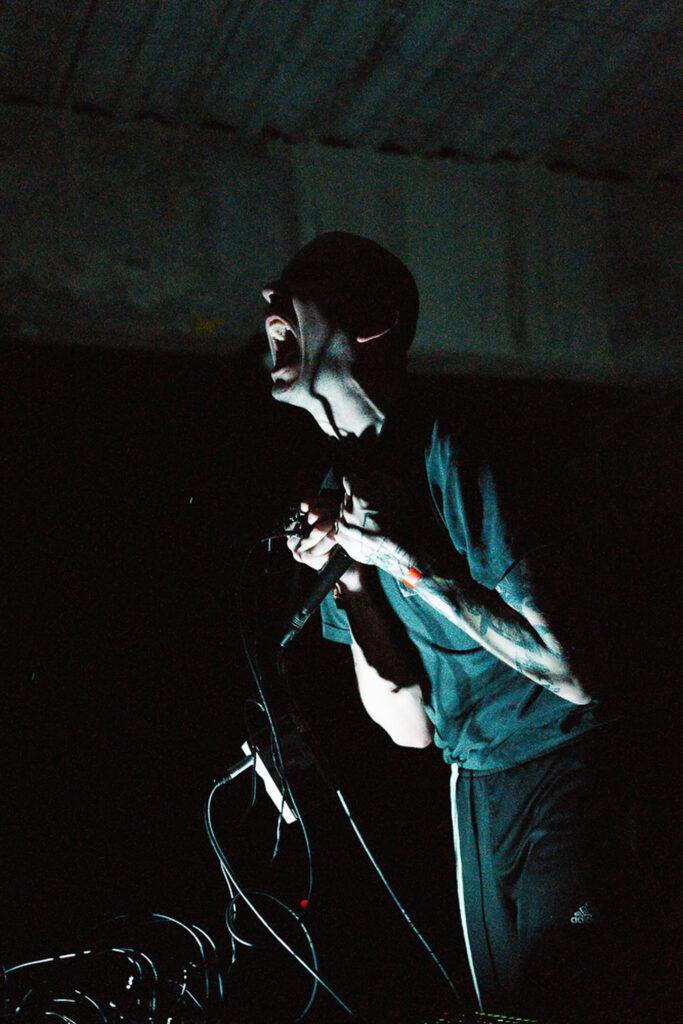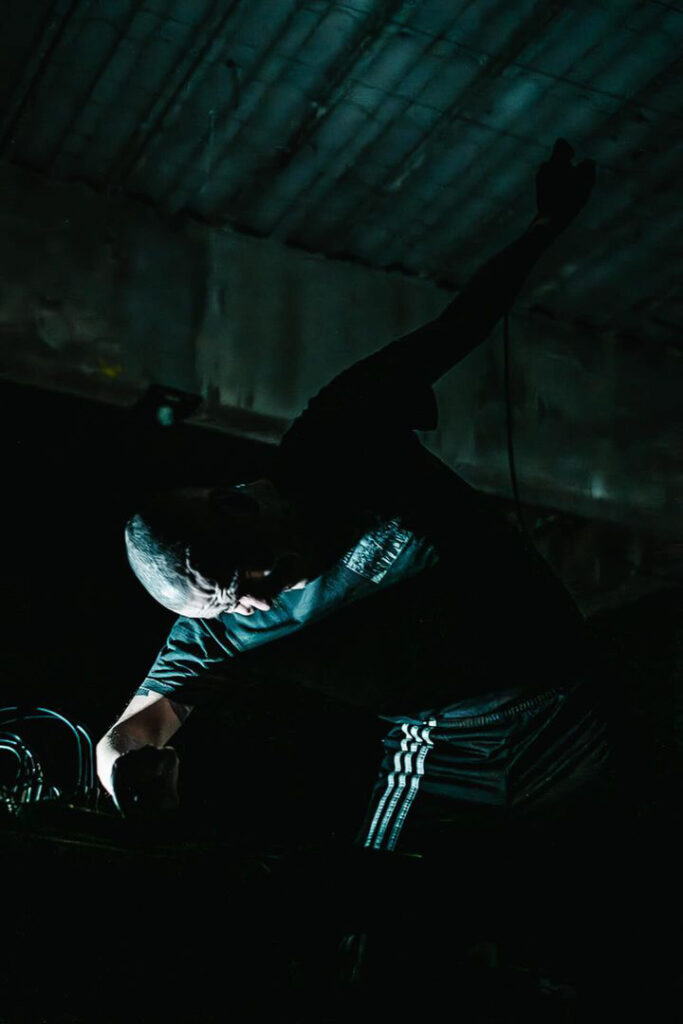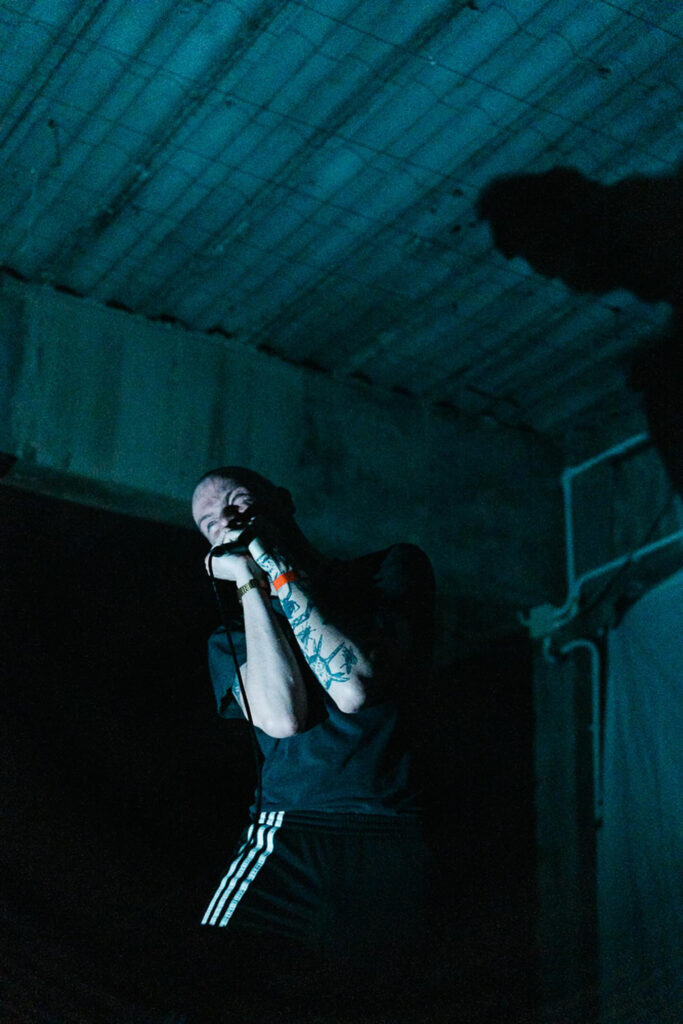Cover Photo Credit: Defne Karaca
Dutch harsh noise artist Kevin Jansen is known for his extreme music and very physical and dark live performances as Svartvit. We interviewed Kevin in Istanbul only a few days after his Karga Kadıköy concert on 28 September 2024. So, the publication of this article has been a long journey, but we now proudly present it to you two months later.
Is this your first interview with a Turkish platform?
Yes. I haven’t done interviews in a long time, actually. Some years ago, everyone was doing them. I don’t know what happened, but it seems like they happened less because I had a time where people ask me quite often, especially at shows, but for a few years now, I think the music press is just getting less, right? I think it shifted a bit, because now what I see that happens more is that people make podcasts, and they do really long interviews and they put them out in full. You will have a two-hour episode with one artist or something like that. You see that kind of stuff, and maybe not so much the articles. I still like to read interviews. I used to collect zines. I go through old ones sometimes.
Virtually, every printed magazine I had been following in the past has gone now. Only The Wire keeps going.
Yeah. They never did full articles or anything, but I got mentioned in there a few times in releases, show announcements, or things like that. You can see that they are people who pay attention. But, I mean, they’re pretty big.
Let’s explore your musical background. What did you listen to in your much younger teenage years?
I first started listening to nu-metal. Slipknot, Korn, those kind of bands. I think that especially Slipknot was a big thing for me, because already back then, I noticed the little intros and the weird electronic things that they had on their records, some of it is almost noise. I found those very interesting, because I didn’t hear that in other bands that I knew at the time. And then you just kind of keep looking for more extreme stuff. From there, I went to Slayer and Cannibal Corpse, you know, always looking for faster and louder and more distorted. The point where you feel like it cannot go further, it’s always still going further.
I was very curious always about the outer edges of what’s possible. In the Netherlands, we have a genre called gabber. It’s super fast and has high energy, all the drums are distorted and just blown out. A lot of the themes also reference horror movies. They sample that kind of stuff. It’s this kind of genre where I feel people are just looking for an ultimate limit. I think I have this curiosity with every kind of sound, not just rock and metal.
I want to ask you a clichéd question: Do you have an album that shifted you profoundly?
I think I have a lot of albums that, over time, opened up new doors and new directions. Maybe one that was very influential to me was Diamanda Galas. Have you heard of her?
Yeah, she’s great.
She has this piece called The Litanies of Satan. It’s mostly vocals, but her vocal range is already very wide, and then it’s affected and manipulated in ways that sound completely unhuman, demonic. It goes really far in its range. She is really interested in lyrics and literature. She often uses poets or literary quotes as material for her lyrics. But what I find very interesting about her is that also without any of the lyrical content, just the intensity that is behind the voice and the way that the sounds are produced, they communicate so much. Even if you don’t understand what she’s saying very often. It’s almost indecipherable because of how she is singing, but it still has a lot of communication, and that’s just by the kind of sound she produces. I saw a video of her performing this piece, and it was heavily edited with a lot of effects, but what I think was most impressive was her presence, because she wasn’t necessarily moving a lot, or doing extreme acts or anything, she just radiates this sort of extreme energy. Which I found, I think, for the performance part, super inspiring.
But I would say that a lot of the inspiration also comes from things outside of music. There’s this group called the Viennese Actionists. It’s artists from Vienna. The most famous one is Hermann Nitsch. He made these paintings using blood, did performances that would last multiple days, and included whole groups of people and lots of items and food. It was almost like a kind of religious mass or something. The group has multiple artists. They were studying at the art academy, and they were making this performance art, mostly very controversial stuff. So at the time, they also very often couldn’t perform it in public. They had to film it and then show the film because otherwise, they got into problems with the authority. The most important material they were using in their art was their own body. They would paint on it, or they would put themselves in very uncomfortable situations. But they were not just performing a play, they were really using the body as material. They really put themselves 100% into their work. There was no “the artist and the art.” The two were the same thing. I thought that was quite special, trying to somehow include something physical in the music. That was, to me, a really inspiring thing to see.
That physical kind of performance art, as well as what Diamanda Galas is doing, really encapsulates what you are doing through your art.
Yeah.
When did you first try to do what you are doing as Svartvit, and how did that work out initially?
That was in 2009. At the time, I was really into stuff like hardcore punk, grindcore, and things like that. So really fast, really loud things. I was also playing that kind of music at the time. Some of the more noisy grindcore bands would do records together with noise artists. So through that, I found my first noise things, and I was immediately interested in the fact that they didn’t have to stick to any kind of music rules. There was no “Oh, it needs to be in this tempo”, or “it needs to have this part and this part.” It’s like, anything goes. No rules anymore. Just go crazy. So I wanted to try that. O
Obviously, I didn’t really know what I was doing initially, so I just used what I had with me. I had a bass guitar, an overdrive pedal, a microphone, and an amp. That was it. So it was just finding crazier settings on the pedal, trying to get some feedback going with the amp first with the guitar, and then later with the microphone. You can get some extreme sounds out of that, but it’s also, in a way, quite limited in the possibilities that you have. So I looked into more of this music around that time, and it was going really fast. I was just checking out new stuff every day, trying to figure out what people were using, and where this stuff was coming from. So I discovered some more industrial bands and things like that. And then slowly, I figured out kind of what equipment could maybe be useful. So I got a multi-effect pedal to be able to manipulate the sound more.
It took quite some trying before I found anything that I thought was interesting, but it was an exciting process because it felt really liberating to not have to stick to those kinds of expectations of music genres and also to be able to do it by yourself. The fact that you don’t have to agree with other people on how it should sound, but that you can just do what you want. Very direct. If I want to make stuff today, I can make it today. And I don’t have to ask anyone’s opinion. You can just have it out there very quickly. So I think at that time, that was also, for me, coming at a good moment, because I like playing in bands, but I also felt that it’s always compromise. You always have to kind of find the middle ground between everyone in the band. And sometimes it works and you get really nice results, but sometimes, it feels like you cannot fully put the thing that you want to express into it. I think for me, noise is the most pure form of expression because there’s no filter from other people or genre equipment. You can go anywhere in any way. That makes it kind of a very open space for me to work in.
I still work with other people making other things, sometimes even things that are also noise or kind of related sounds. But I think the moment I knew that I wanted to also do solo stuff was when I was doing those experiments and I was noticing that I could express things that were not possible in collaboration with other people. That was really important for me. When I play solo now, I put a lot of intensity behind it. For me, it’s quite a personal thing to do. It’s really like removing all the layers.
Almost like an intimate diary.
Yeah. It’s very intimate. I only show myself in that way in those moments. Sometimes I find it difficult, but it feels also very powerful to be able to do that because it’s not easy to do. When you do it especially in front of an audience, there’s some sort of power behind it that you feel like, “Okay, this is all I have to give.” Whatever people feel about it, it’s okay, I’m just gonna throw it out there. There’s some sort of liberation in that, that you can just express yourself like that. It’s like some catharsis, you know? Some people go kickboxing or running or whatever to get something out of their system, and this is what I do.
Among the current instruments and tools in your setup, do you have a favorite?
Most of the sounds that I make now is based on manipulating recordings that I make. I record quite simple sounds. Some pieces of metal, or stone, or my own body. Then I use different samplers and effects to change those sounds to the point where you can almost not recognize them anymore. I find it really interesting to take kind of small or quiet sounds and then really blow them out of proportion. Also in the show, I work with some broken guitar strings and I put a little microphone on them and there’s a lot of vibration in it that you normally don’t really hear, because it’s very quiet. But if you amplify it, they sound almost like thunder or something. I still use some synths here and there. But the thing that I find most interesting is to take a sound and then turn it into something else. So if I use a synth, I record it and then I still go and manipulate that sound filter. Slow it down, reverse it, cut it up. Those kind of things.
For a favorite, it feels wrong to pick one. (laughs) The one that I think I should mention is this overdrive pedal that I had from the start. I have to mention it because at this point, after almost 20 years of making different types of music, I have never made anything without it. It’s always there. It has a certain character to the sound.
An old friend.
I’ve used it in very different ways throughout the years. In the beginning, I was thinking, “Oh, I need to turn it all up to the maximum.” You know, to get the most distorted sound. I was doing that on the bass. It made the bass sound almost like a distorted guitar. It was barely a bass anymore. Now I turn the overdrive all the way down. So it’s almost like a clean boost. It just makes sounds go crazy volume-wise on microphones and things like that. I have used it a lot in the shows. It’s like a magnifying glass on sound. So the little vocal things become extremely blown up to the point that it starts feedbacking and it really goes crazy. This one I had to mention.
Also recently, I got inspired by a friend, and I bought a looper pedal. I bought this specific one because it’s the most playable looper as an instrument that I’ve ever seen. It has a little mixer and a tempo slider on it. A big part of the sound now is to record anything into that. Microphones or synths or other samples, and to then put it on multiple channels, play with them, make it stereo, make it go. Kind of move throughout the room and play with the tempo. It’s also a way to challenge myself. I put one sound into it, and then you have so many options on the thing that you can make a whole piece out of one sound. It brings it closer to what I want to do. I want to put minimal sounds into it, and get maximum results out of it. This looper really gives me the possibility to do that.
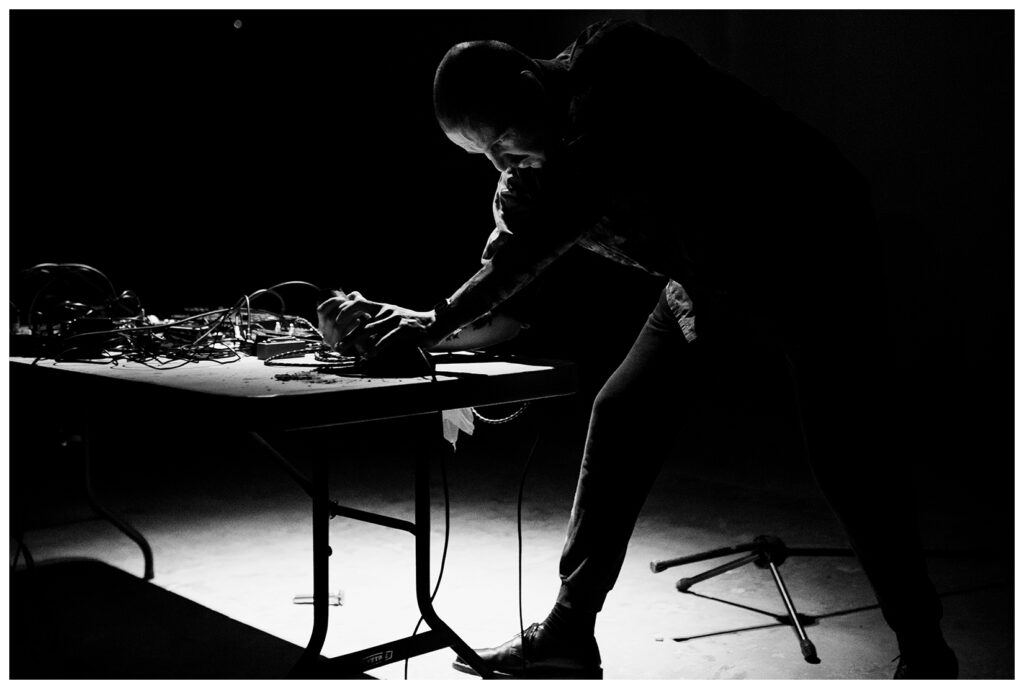
Isn’t it fascinating that all the possibilities of sound are endless, basically?
Yeah, absolutely. And I think that’s also sometimes almost a risk because if possibilities are endless, it’s really tempting to keep messing around forever because you can always try a new thing and then try another thing. So what I did in the last few years is I tried to limit the amount of equipment that I use to get the full potential out of the things that I have. I try to only use computers for some editing of recordings, but keep the actual process of making the sound quite simple so that you really find all the possibilities within that. This looper pedal, for example. It is good to try and make the most of a live performance out of this one battle because you really start to get more creative with how you use it because you have to. Otherwise, it’s not gonna be enough for the show, you know? I bought it quite recently, and now I played three days in a row, played two shows in Amsterdam and then here at Karga Kadıköy. Even in those three days, I was able to see new options or new things that if I would give myself ten times more equipment, I probably wouldn’t discover, because I would get lost in the options. So I try to restrain myself and bring a small amount of stuff.
While putting contact microphones in your mouth, do you ever have accidents?
Oh, yes. It happened multiple times. Whenever I play, there’s always some spit, some saliva, or whatever being produced, because that’s just what the body does. But I try to get this very visceral, very pure sound, which means that sometimes you demand too much from your body. So I definitely had shows where I saw my dinner come out of my mouth. It happens, and that’s okay. I know that if I contained myself a bit more, I could probably prevent this from happening. It’s not impossible to stop this, but I think that there being the risk that this might happen creates a sort of tension that people in the audience can also feel, and they see that it’s real. Whatever happens, happens. Yeah, it brings a strong response. I can tell that anything, even just the sounds of anything related to the mouth, and spit and vomit and things like that, it gives people a physical reaction. It’s interesting to me to play with that.
Does an example of a strong reaction come to your mind?
I think it differs from person to person. People often come up to me afterward and they talk to me about the show. If someone comes up to me and they are like, “Oh, from the second you started playing, I was kind of just nailed to the floor and I just didn’t move the whole time.” I think that’s a strong reaction in some way. People are just sort of dragged into it immediately, and you have this grip and the whole show is like that.
Did they mention that as a positive reaction?
I think that’s the interesting thing about what I do. It can bring up negative feelings in people, but that doesn’t mean that it’s necessarily a negative experience. I think there’s a space created where it’s okay for it to also give that sort of response. Maybe because I go into it myself in such a full-on way, people feel okay about having that. If they feel maybe uncomfortable or they feel kind of overwhelmed, I think they understand that that’s maybe part of what’s happening and that it’s okay to experience it at that moment. Maybe it’s actually nice to experience it in such a setting instead of just in daily life. You know, almost create kind of the possibility for also the audience to maybe work through some difficult things or something. So I think that’s okay. But then on the other side of the spectrum, you also have people that find it so intense that they had to leave at some point.
That happens in many extreme art forms. In cinema, at exhibitions…
Yeah. I know that on some film festivals, it’s almost like a compliment to certain filmmakers when most of the audience leaves after 20 minutes. You manage to create something so intense that people have to escape. That’s not necessarily a bad thing. And I think now I’ve been doing this for long enough that most people coming to the show maybe know what to expect to some extent. They have a certain awareness of what might happen, and that’s all right. As for people who have never seen me before, sometimes I get very interesting comments from people who don’t know this music at all, and they just happen to be at one of the shows.
They want to find out more.
Yeah. They are super curious. They’re confused but in a very positive way. I think a lot of people who discover this kind of stuff at first are confused. I was confused when I first discovered it.
Isn’t that all of us? When we first encounter extreme music?
Yeah. I think it’s nice to still be able to have that experience. Especially if you haven’t had that for a few years, and then you find something that gives you this feeling. It lets you know that there’s still more stuff out there for you to discover.
How often do you get into trouble with organizers at venues for the extreme nature of your performances?
It’s not the most popular stuff for venues to organize. It has a small audience, so financially, it’s not always the best option for them. Because of the kind of sound that I play with, very high frequencies or very low frequencies at a high volume, they are often concerned about the equipment. So sometimes you get into issues with people doing the sound that they don’t want to give you the volume that the show needs. But I had these issues much more in the beginning. I’ve noticed over the years that if you show the technical people that you know what you’re doing, that you understand the equipment that you’re working with, and also understand the limits of their equipment, it’s fine. As soon as they figure out that you are not gonna surprise them or you’re not gonna run into problems that you don’t know how to deal with, they become a lot more easygoing. So I think it’s about kind of letting them see that you are a professional or whatever. I hate to put it that way, but you need to give them some confidence in the fact that you know what you’re doing. Most of the time, it’s okay. You still have rare situations where they just hate what’s happening.
And obviously, you became more and more professional over the course of 15 years.
Yeah. A sound person very often asks you to just give the loudest sound that you are going to produce because then they know where the maximum is. If they see that you do that and everything else that you do stays below that level, then they understand. Okay, you really know where your limit is. I’m sure that in the beginning when I was doing it and they asked me for my loudest sound, I probably went much louder still. I understand that they are a bit afraid, but sometimes you get really lucky and you have a person doing the sound that really likes what you’re doing, understands what you’re doing, and then it feels like you’re on the same side and you’re trying to really get the best sound out of it instead of it being like some sort of battle. Sometimes, every time I turn the volume up a bit, they turn it down a bit. (laughs) You feel this clash between the two of you, but other times you have sound people that come up to you afterward like, “Oh, yeah, it was really good!”
Speaking of extreme performances, what do you think was your favorite extreme performance you attended as an audience?
I’ve seen a lot of different things over the years, but I think one thing that was quite influential to me when I saw it is a guy called Justice Yeldham. He’s a noise artist, and he plays sheets of glass with his mouth. He puts a microphone onto it, and then he kind of rubs his face against the glass, making sounds. Because of the resonance, it gets picked up by the microphone. Obviously, the glass is very sharp, so a lot of accidents happen. I’ve seen him multiple times, but especially early on, he was getting cuts everywhere, and there was blood all over the glass. It was soundwise very intense stuff. Also visually, you see how it’s made. You see the danger, you see the injuries. It’s very confrontational stuff.
There’s extreme, and then there’s extremely extreme.
Yeah. And very often he would end his shows back then by throwing the piece of glass. So it would just burst into a thousand pieces and go everywhere.
Does the audience ever get hurt by this?
Yeah, sometimes. I mean, there are some shows that get very physical or performers really go into the crowd, really look for that confrontation. Sometimes stuff happens -accidentally or not-, but I never really had a problem with that. I think a certain amount of danger in those kinds of things is acceptable. You shouldn’t go too far, too extreme with it. But as long as everyone knows what they’re getting into, it’s okay. You know that if you go to a volcano, you might also run into issues. It’s part of the setting.
When I interviewed Oliver from A Place to Bury Strangers, I asked him about the artists he would like to collaborate with, and he told me he would prefer someone totally unexpected, preferably a pop star like Harry Styles, and that they would be the opening act just to shock people. Do you have someone on your mind like that?
I’m gonna cheat a bit because I’m a massive fan of Scott Walker. He started out making sixties pop music with the Walker brothers. Very catchy stuff. They had hit songs…
He definitely has had an interesting journey.
He went in the opposite direction most people would go. Most bands start out wild and extreme. Then they get popular and they make their sound more accessible. He started making the most accessible pop music you could possibly make. Years later, he ended up making the weirdest experimental records.
He’s dead, so it’s not gonna happen, but I would like to collaborate with him.
In the sixties or later?
Somewhere in the middle. I think if I collaborated with him towards the end of his career where he was making very experimental stuff, that would maybe be less interesting. It could have been more interesting to collaborate with him around the time when he was starting to get into that, starting to use more electronic things. He has this very characteristic voice. Very clear, very dramatic. He sounds like he could also perform in theater, he really is a performer. I think it would be interesting to combine my sound and the thing that I do, which is often very abstract and very kind of affected and manipulated, with something as clean and as present as his voice. Could be a good combination.
I wish Scott was still alive.
Me too. I was hoping so much to see him live at some point. He collaborated with Sunn O))), which still feels crazy. I was hoping because of that, maybe the Roadburn Festival in the Netherlands could get him to play there. But then he passed away. He was the top of my artist wishlist to see life, and unfortunately, it’s not gonna happen.
If you have access to your streaming platform right now, can you name the last three tracks you streamed?
I don’t use streaming a lot, so it’s gonna be horrible.
I will note down that you said that.
I’m really gonna put myself on blast here right now. Do you know Ice Spice?
Yeah.
I was listening to her new record, Y2K. I have a soft spot for this kind of stuff.
You should be the opening act for her.
Yeah. She’s playing in the Netherlands pretty soon. I’m considering going because I really like the music, but I’m sure that the performance will be terrible. (laughs)
Especially when I am traveling, I listen to stuff completely different than what I make at home. I have my collection of vinyl and cassettes and all that kind of stuff, and there is a lot of experimental music and noise and things in there, but digitally and on the go, it’s hip hop, gabber, and even nu metal. One of the other things I listened to was Deftones.
It’s good to have some contrast here and there. I would say I’ve been on a lot of tours in a van with people driving around. My least favorite type of tour is when in the van, you listen to the same type of music that you are making. If you’re touring with a hardcore punk band and in the van, you’re also listening to hardcore punk, that means that every day you are listening to that music for 10 hours because you’re listening to it for the drive and the whole show. That’s too much. I remember one tour where we listened to “Don’t Stop Believin’” by Journey. It was on repeat. Everyone was singing along in the van. It was so much better than the harsh stuff. Especially if what you do is this heavy, you need a break. You need a lot of breaks.
That was all of my questions. If you have something to add, please do.
Maybe in a very general way, I can say that so far, my time here in Istanbul has been really good, that I enjoy how lively the city is, how many people are on the streets, how much everything is sort of filled with history and culture. I hope to come back to see some more of the country. I have been told that it’s also possible to play this kind of music in Ankara. I would definitely like to come back and explore more.
Are you satisfied with this interview?
Yeah. I’m happy that we did that.
You can check out Svartvit’s Bandcamp profile here.

